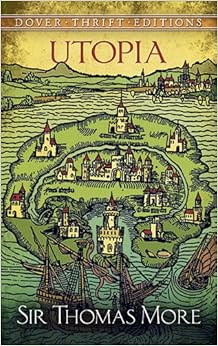The Hunger Games novels represent a long historical tradition of dystopian literature. But that tradition would never have come into existence if it hadn't been preceded by its flip side: utopian literature. And utopian literature had its start in the 16th century, with the 1516 publication of Sir Thomas More's groundbreaking novel,
Wait, you say. That Thomas More? The one whom Henry VIII ordered executed for refusing to acknowledge the validity of Henry's newly-invented, purpose-driven Church of England? Yes, friends, that very same dude coined the word "utopia" and published the first literary work about an imaginary perfect society.
But who was this guy? I'm glad you asked. He was born in London in 1477 and was elected to Parliament in 1504. During his studies to become a lawyer, More decided to enter a monastery, and tried to pursue both careers simultaneously. After several years he gave up studying for the priesthood, but remained a pious believer (and, secretly, a wearer of a hair shirt) for the rest of his life, even though he married (twice) and had children.
As a capable and respected undersheriff in London, More caught the attention of Cardinal Wolsey, who brought him into the service of the young King Henry VIII. More rose quickly, soon becoming the king's personal secretary and advisor. In 1523 he was elected as speaker of the House of Commons. All went well for him until Henry, in order to be able to divorce his first wife, Katherine of Aragon, created the fiction that the 20-year-long marriage must be annulled and that Henry himself was now the supreme leader of the English church.
More's conscience did not allow him to go along with this, marking the beginning of his end. He was imprisoned in the Tower of London in 1534, indicted for high treason in 1535, and beheaded on Henry's orders not long after.
But long before More's fall from the king's favor - in fact, shortly before he gained the king's favor in the first place - he wrote and published "Utopia," a name he created from the Latin words for "no place." The novel is written in two parts: the first contains criticisms of then-existing English society, and the second describes an island society, situated in some unspecified location in the New World, in which all aspects of life are governed by reason rather than self-interest.
Some of the more unique features of Utopian society include:
- No private property. All goods are stored in warehouses, and people request what they need.
- Private space does not exist. No doors can be locked. The communal households all consist of 30 people, and everyone is under constant observation by everyone else.
- Discussion of politics outside of the appropriate forum is punishable by death.
- Euthanasia is practiced.
- So is pacifism, if at all possible.
- Houses, which are all built more or less alike, are rotated among citizens every ten years.
- Every household is issued two slaves (who are either foreigners or criminals). One of the ways a Utopian becomes a slave is by being caught traveling around the island a second time without your internal passport.
- There are judges, but no lawyers.
- Although premarital sex is punished by a lifetime of enforced celibacy, before marriage the proposed bride and groom are displayed to each other naked (to avoid surprises). Penalties for adultery: 1st offense, slavery; second offense, death.
- Divorce, married priests, and female priests are permitted. There are a number of religions on the island, mostly pagan, all tolerant of each other.
- Every citizen must spend occasional two-year stints on farms doing agricultural work.
Of course, no one will ever know the answer to any of these questions. But what we do know is an old adage that probably dates back before the 16th century: one man's meat is another man's poison. Some of the laws of Utopia sound like they were borrowed from the Taliban, if you ask me. Maybe Utopia and Dystopia are not that far apart after all.
All right, stay with me here. Without Thomas More, there would be no utopian literature. Without utopian literature, there would be no dystopian literature. And without dystopian literature, there would be no Hunger Games. Thus, Thomas More is the great-great-great-great-etc.-grandfather of Katniss Everdeen.
Don't believe me? Look closely. There's Katniss, up at the top. And here's Tom.
Boom. Is your head exploding yet? How did people ever miss the resemblance???
p.s. For a great essay about dystopian novels, go to Heather Jackson's http://writeonsisters.com/writing-craft/masterplots-theater-d-is-for-dystopia/. All her other A to Z posts about literary genres are terrific too!

No comments:
Post a Comment